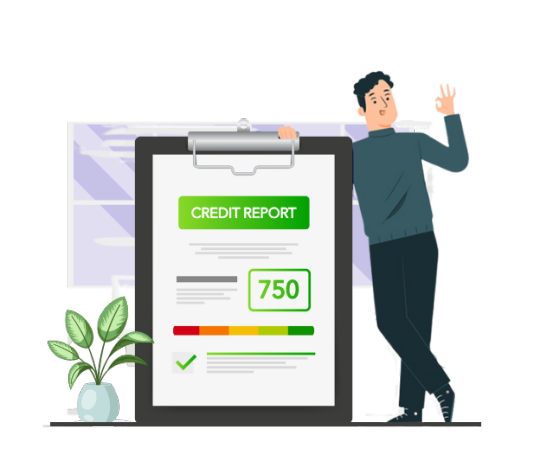Text
Deciphering Your Credit Score by Experian: A Comprehensive Guide
In the contemporary financial landscape, comprehending your credit score is paramount. Experian, a prominent credit bureau in India, plays a pivotal role in assessing your creditworthiness. This comprehensive guide is designed to illuminate the intricacies of the credit score by Experian, why it holds significance, and practical steps to enhance your financial standing.

Understanding the Credit Score by Experian:
Experian is one of India's leading credit bureaus, specializing in collecting and maintaining credit information for individuals and businesses. They utilize this data to calculate credit scores, which fall within a range typically from 300 to 850, with a higher score indicating stronger creditworthiness.
Why Your Credit Score by Experian Matters:
Your credit score by Experian carries immense weight because it directly influences the decisions of lenders when you apply for loans or credit cards. Lenders rely on these scores to gauge the risk of lending to you. A robust credit score can open doors to loans with more favorable terms, while a lower score can result in loan rejections or higher interest rates.
Tips to Improve Your Credit Score by Experian:
Punctual Bill Payments: Timely payment of bills, including credit card dues and loan EMIs, can significantly boost your credit score. Consider setting up reminders or automatic payments to ensure you never miss a due date.
Manage Credit Utilization: Aim to keep your credit card balances below 30% of your available credit limit. High credit card utilization can have a negative impact on your Experian credit score.
Diversify Your Credit Portfolio: A diverse mix of credit types, such as credit cards, loans, and mortgages, can positively affect your creditworthiness.
Regularly Review Your Credit Report: Periodically scrutinize your credit report provided by Experian for inaccuracies and discrepancies. If you come across any errors, take swift action to dispute and rectify them.
Exercise Caution with New Credit Applications: Avoid making numerous credit applications within a short timeframe, as this can raise red flags to potential lenders.
Maintain a Lengthy Credit History: The length of your credit history is another crucial factor. Keeping older accounts open and active can demonstrate a responsible credit track record.
In conclusion, your credit score by Experian is a vital instrument that significantly shapes your financial prospects. By grasping the mechanics behind this score and adhering to best practices to elevate it, you can bolster your creditworthiness. This, in turn, makes it easier to achieve your financial goals and secure loans with more favorable terms. Empower yourself to seize control of your financial future by managing your credit wisely and understanding the nuances of your credit score by Experian.
#credit#bank#finance#budgeting#loans#financialplanning#debtfree#personalloan#marketing#money#credit score by Experian#Experian credit score#experian#equifax#credit bureaus#credit reports#transunion#adulting
0 notes
Text
0 notes
Text
Know How CIBIL Score Repair Agencies Work: A Comprehensive Guide
Your CIBIL score plays a pivotal role in your financial life in India. It determines your creditworthiness and can significantly impact your access to loans, credit cards, and favorable interest rates. If you're considering utilizing the services of a CIBIL score repair agency to improve your credit profile, it's essential to understand how these agencies operate. In this comprehensive guide, we'll delve into the workings of CIBIL score repair agencies and introduce you to CreditKlick, a reputable company in this field.

Understanding CIBIL Score Repair:
What Is CIBIL Score Repair? CIBIL score repair involves the process of identifying and addressing factors that negatively impact your CIBIL score. This may include errors on your credit report, outstanding debts, or other issues that hinder your creditworthiness.
Why Consider CIBIL Score Repair? A higher CIBIL score can lead to better loan terms, lower interest rates, and improved access to credit. Repairing your CIBIL score can potentially save you money and enhance your financial prospects.
Credit Reports and CIBIL Scores: Credit bureaus like CIBIL compile your credit history into a report, and your CIBIL score is derived from this information. Lenders use this score to assess your credit risk.
How CIBIL Score Repair Agencies Work:
Consultation and Assessment: When you engage a CIBIL score repair agency like CreditKlick, the process often begins with an initial consultation. During this consultation, the agency assesses your credit report, identifies issues, and understands your financial goals.
Credit Report Review: The agency thoroughly reviews your CIBIL credit report, looking for inaccuracies, errors, or negative items that need attention. Common issues include incorrect personal information, duplicate entries, or overdue payments.
Dispute Resolution: If the agency finds inaccuracies or errors on your report, they will initiate disputes with the credit bureau(s) reporting the information. The credit bureaus are legally obligated to investigate and correct any errors found.
Customized Credit Improvement Plan: CIBIL score repair agencies create personalized credit improvement strategies tailored to your specific financial situation. This may involve negotiating with creditors, addressing outstanding debts, and developing a plan to enhance your creditworthiness.
Credit Education: Many agencies, including CreditKlick, provide educational resources and guidance to help you understand credit management and develop responsible financial habits. This empowers you to make informed decisions regarding your credit.
Progress Tracking: CIBIL score repair agencies monitor your credit report and provide regular updates on your progress. They help you stay informed about changes in your CIBIL score and credit report.
CreditKlick: Your Trusted CIBIL Score Repair Partner
CreditKlick is a reputable CIBIL score repair agency in India, offering comprehensive services to improve your credit profile. Here's what sets them apart:
Credit Analysis: CreditKlick begins with a thorough analysis of your CIBIL score and report, identifying areas for improvement.
Error Resolution: They work diligently to rectify errors and inaccuracies on your CIBIL report, ensuring its accuracy.
Customized Strategies: CreditKlick tailors a CIBIL score repair strategy to your unique financial circumstances, with a focus on removing negative items and enhancing your creditworthiness.
Credit Education: They provide financial literacy resources and guidance to empower you to make informed decisions about your credit.
Progress Monitoring: CreditKlick continuously monitors your CIBIL score and provides regular updates on your credit repair journey.
Conclusion:
Understanding how CIBIL score repair agencies work is essential if you're considering using their services to improve your credit health. Whether you choose to work with CreditKlick or another reputable agency, the goal remains the same: to navigate the complexities of credit reports and scores, correct errors, and develop strategies for lasting credit improvement. While these agencies can help address specific issues, maintaining responsible financial habits, such as making timely payments and managing your credit wisely, is crucial for ensuring a sustained positive credit profile in the long run.
#credit#bank#finance#loans#debtfree#budgeting#financialplanning#marketing#money#personalloan#creditrepair#creditimprovement
0 notes
Text
Do I Need A Good Credit Score For A Home Loan
When it comes to purchasing a home, one of the key factors that lenders consider is your credit score. Your credit score plays a crucial role in determining your eligibility for a home loan and the interest rate you'll be offered. In this article, we will explore the importance of having a good credit score when applying for a home loan and answer some frequently asked questions related to credit scores and home loans.
What is a credit score? A credit score is a numerical representation of your creditworthiness. It is calculated based on your credit history, including factors such as your payment history, credit utilization, length of credit history, types of credit, and new credit applications. Credit scores typically range from 300 to 850, with higher scores indicating a lower credit risk.

Why is a good credit score important for a home loan?
Lenders use your credit score to assess the level of risk they will incur by lending you money. A good credit score indicates that you have a history of responsible borrowing and are likely to repay your debts on time. Here are some reasons why a good credit score is crucial for a home loan:
Loan approval: Lenders often have minimum credit score requirements for home loan applicants. If your credit score falls below their threshold, your loan application may be rejected.
Interest rates: A higher credit score can help you secure a lower interest rate on your home loan. This can significantly impact the total amount you will pay over the life of the loan. Even a small reduction in interest rates can save you thousands of dollars in the long run.
Loan terms: A good credit score can also influence the loan terms offered to you. Lenders may be more likely to offer favourable terms, such as a higher loan amount or longer repayment period, to borrowers with excellent credit scores.
Frequently Asked Questions:
What is considered a good credit score for a home loan?
While credit score requirements can vary among lenders, a score of 700 or above is generally considered good for a home loan. However, keep in mind that each lender may have its own criteria, and other factors such as your income, employment history, and debt-to-income ratio will also be taken into account.
Can I get a home loan with a bad credit score?
While it may be more challenging, it is still possible to get a home loan with a bad credit score. Some lenders specialize in offering loans to borrowers with less-than-perfect credit. However, you may face higher interest rates, stricter terms, or the need for a larger down payment.
How can I improve my credit score before applying for a home loan?
If you have a less-than-ideal credit score, there are several steps you can take to improve it:
Pay your bills on time: Late payments can have a significant negative impact on your credit score. Ensure that you make all your payments by the due dates.
Reduce your debt: High credit utilization, which is the ratio of your credit card balances to your credit limits, can harm your credit score. Aim to keep your credit utilization below 30% and pay off as much debt as possible.
Check your credit report: Regularly review your credit report to identify any errors or inaccuracies that could be dragging down your score. Dispute any incorrect information with the credit bureaus.
Avoid new credit applications: Applying for multiple credit accounts within a short period can lower your credit score. Limit new credit applications while you're preparing to apply for a home loan.
In conclusion, having a good credit score is essential when seeking a home loan. It not only increases your chances of loan approval but also allows you to secure more favourable terms and interest rates. If your credit score needs improvement, take proactive steps to enhance it before applying for a home loan. Building a strong credit history will not only benefit you in securing a mortgage but also in future financial endeavours.
#credit#bank#finance#loans#debtfree#budgeting#financialplanning#money#personalloan#marketing#credit score#cibil score#home loan#loan
0 notes
Text
15 Tips About Credit Card Personal Loans
Credit card personal loans, also known as credit card cash advances, can be a convenient way to borrow money when you need it. However, they can also come with high interest rates and fees if not used wisely. In this article, we'll provide 15 tips about credit card personal loans to help you make informed borrowing decisions.
Know the terms: Before taking out a credit card personal loan, make sure you understand the terms and conditions, including the interest rate and any fees associated with the loan.
Consider alternatives: Credit card personal loans should only be used as a last resort. Consider alternatives such as a personal loan or a home equity loan.
Borrow only what you need: Only borrow what you need and can afford to repay. Avoid the temptation to borrow more than you need, as this can lead to unnecessary debt.
Pay off the balance in full: Whenever possible, pay off the balance of your credit card personal loan in full each month to avoid interest charges.
Don't use it for everyday expenses: Credit card personal loans should not be used for everyday expenses, such as groceries or gas. Use them only for emergency expenses.
Shop around: Shop around for the best interest rates and fees before taking out a credit card personal loan.
Watch out for fees: Credit card personal loans often come with fees, such as transaction fees or cash advance fees. Make sure you understand the fees associated with the loan.
Understand the interest rate: Credit card personal loans typically come with high interest rates. Make sure you understand the interest rate and how it will impact your overall debt.
Don't rely on it as a long-term solution: Credit card personal loans should not be relied on as a long-term solution to debt. Instead, focus on paying off the balance as quickly as possible.
Avoid using it to pay off other debt: Using a credit card personal loan to pay off other debt can lead to a cycle of debt. Avoid using it for this purpose.
Apply For a Personal Loan
Use it only for emergency expenses: Credit card personal loans should only be used for emergency expenses, such as medical bills or car repairs.
Make payments on time: Make sure to make payments on time each month to avoid late fees and damage to your credit score.
Don't use it for luxury expenses: Credit card personal loans should not be used for luxury expenses, such as vacations or designer clothing.
Avoid taking out multiple loans: Taking out multiple credit card personal loans can quickly lead to debt. Avoid taking out more than one loan at a time.
Create a repayment plan: Create a repayment plan before taking out a credit card personal loan. This will help you stay on track and avoid unnecessary debt.
Conclusion
Credit card personal loans can be a useful tool in times of emergency, but they should be used with caution. By understanding the terms and fees associated with the loan, avoiding luxury expenses, and creating a repayment plan, you can make informed borrowing decisions and avoid unnecessary debt.
Visit website for more info: Click Here
Apply Personal Loan: Click Here
#personalloan#loans#borrowing#money#financialaid#financialhelp#interestrates#credit#debtfree#budgeting#finances#cash#banking#funding#creditworthiness#lending#repayment#financialplanning#mortgage#creditunion
0 notes
Text
#finance#money#investing#budgeting#savings#personalfinance#financialplanning#wealthmanagement#retirementplanning#credit#debtfree#financialfreedom#stocks#investments#financialliteracy#moneymanagement#taxes#mortgages#loans#insurance#entrepreneurship#bank
3 notes
·
View notes
Text
#creditcard#finance#bank#loans#personalloan#homeloan#businessloan#reditrefine#reditcorp#credit#creditcorp#marketing
0 notes
Text

How to boost your credit score creditklick
#credit#creditrepair#creditrefine#creditcard#finance#bank#loans#personalloan#homeloan#businessloan#reditrefine#reditcorp#creditcorp#marketing
0 notes
Text
How to Calculate Cibil Score Online
Your credit score is an important factor in determining your financial health. It is used by lenders to assess your creditworthiness and determine whether you are eligible for a loan or credit card. A good credit score can help you get better interest rates and terms on loans, while a bad score can make it difficult to get approved for any type of financing.
Check CIBIL Score with Full Report Free: Click Here
Your CIBIL score is one of the most important factors in determining your creditworthiness. It is a three-digit number ranging from 300 to 900 that reflects your past repayment history and current financial situation. A higher CIBIL score indicates that you are more likely to repay your debts on time, while a lower score suggests that you may be at risk of defaulting on payments.
Check CIBIL Score with Full Report Free: Click Here
So, how do you calculate your CIBIL score? Here’s a step-by-step guide:
Step 1: Check Your Credit Report
The first step in calculating your CIBIL score is to check your credit report. This report contains information about all the loans and credit cards you have taken out in the past, as well as any defaults or late payments you may have made. You can get a free copy of your credit report from the Credit Information Bureau (India) Limited (CIBIL).
Step 2: Analyze Your Credit Report
Once you have obtained your credit report, it’s time to analyze it carefully. Look for any errors or discrepancies in the information provided and contact the relevant lender if necessary to rectify them. Also, take note of any negative items such as late payments or defaults that could be dragging down your CIBIL score.
Step 3: Calculate Your CIBIL Score
CIBIL uses a complex algorithm to calculate an individual’s CIBIL score based on their credit history and other factors such as income level and employment status. The algorithm takes into account various aspects such as payment history, total debt amount, types of accounts held, length of credit history etc., before arriving at a final number between 300 and 900.
Step 4: Monitor Your Score Regularly
Once you have calculated your CIBIL score, it’s important to monitor it regularly so that you can take steps to improve it if necessary. You should also keep an eye out for any changes in the information contained in your credit report which could affect your score negatively or positively.
Step 5: Take Steps To Improve Your Score
If you find that your CIBIL score is lower than expected, there are several steps you can take to improve it over time. These include making all loan payments on time, reducing existing debt levels, avoiding taking out too many loans or opening too many new accounts at once etc., All these steps will help boost your CIBIL score over time so that lenders view you more favorably when assessing loan applications in future.
In conclusion, calculating and monitoring your CIBIL score is an important part of maintaining good financial health and ensuring that lenders view you favorably when assessing loan applications in future. By following the steps outlined above, you can easily calculate and monitor this important number so that you can take steps to improve it if necessary.
Check CIBIL Score with Full Report Free: Click Here
For more info: Visit Now
1 note
·
View note